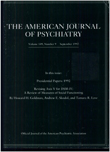Reliability of a Standardized Mini-Mental State Examination compared with the traditional Mini-Mental State Examination
Abstract
OBJECTIVE: The objective of this study was to compare the reliability of the Mini-Mental State Examination with that of a new Standardized Mini-Mental State Examination, which has expanded guidelines for administration and scoring. METHOD: The subjects were 32 stable elderly residents of a nursing home and 16 elderly residents of a chronic care hospital unit. Six raters administered the Folstein Mini-Mental State to 22 of these stable elderly subjects, and five raters administered the standardized version to 26 of these subjects. Each subject was tested on three different occasions 1 week apart. Each rater tested 4-6 subjects at the first and third weeks and 4-6 different subjects at the second week. The analytic technique used was one-way analysis of variance to estimate the interrater variance and the intrarater variance. RESULTS: The intrarater variance on all occasions was reduced by 86% and the interrater variance was reduced by 76% when the Standardized Mini-Mental State was used; the reductions in variance were significant (p less than 0.003). The intraclass correlation for the Mini-Mental State was 0.69; for the standardized version it was 0.90. It took less time to administer the Standardized Mini-Mental State than the Mini-Mental State. CONCLUSIONS: The Standardized Mini- Mental State had better reliability than the Mini-Mental State in this study group. Although the improved reliability of the Standardized Mini- Mental State was achieved by reducing measurement noise, this advantage would likely occur in a broad spectrum of patients.
Access content
To read the fulltext, please use one of the options below to sign in or purchase access.- Personal login
- Institutional Login
- Sign in via OpenAthens
- Register for access
-
Please login/register if you wish to pair your device and check access availability.
Not a subscriber?
PsychiatryOnline subscription options offer access to the DSM-5 library, books, journals, CME, and patient resources. This all-in-one virtual library provides psychiatrists and mental health professionals with key resources for diagnosis, treatment, research, and professional development.
Need more help? PsychiatryOnline Customer Service may be reached by emailing [email protected] or by calling 800-368-5777 (in the U.S.) or 703-907-7322 (outside the U.S.).



